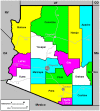The Arizona Prevention Research Center partnerships in Arizona to promote COVID-19 vaccine health equity
- PMID: 35958854
- PMCID: PMC9357975
- DOI: 10.3389/fpubh.2022.944887
The Arizona Prevention Research Center partnerships in Arizona to promote COVID-19 vaccine health equity
Erratum in
-
Erratum: The Arizona Prevention Research Center partnerships in Arizona to promote COVID-19 vaccine health equity.Front Public Health. 2022 Sep 14;10:1031760. doi: 10.3389/fpubh.2022.1031760. eCollection 2022. Front Public Health. 2022. PMID: 36187610 Free PMC article.
Abstract
Background: Vaccine hesitancy in the face of the COVID-19 pandemic is a complex issue that undermines our national ability to reduce the burden of the disease and control the pandemic. The COVID-19 pandemic revealed widening health disparities and disproportionate adverse health outcomes in terms of transmission, hospitalizations, morbidity and mortality among Arizona's Latinx rural, underserved, farmworker, disabled and elderly populations. In March 2021, ~8.1% of those vaccinated were Latinx, though Latinxs make up 32% of Arizona's population. The Arizona Vaccine Confidence Network (AzVCN) proposed to leverage the expertise of the Arizona Prevention Research Center (AzPRC) and the resources of the Mel and Enid Zuckerman College of Public Health (MEZCOPH) Mobile Health Unit (MHU) to identify, implement and evaluate a MHU intervention to increase uptake of COVID-19 vaccines.
Methods: The AzVCN focused efforts on Latinx, rural, un/underinsured and farmworker communities in the four Arizona border counties that are at greater risk of COVID-19 morbidity and mortality and may have limited access to vaccination and other essential health services. The AzVCN used listening sessions to create a feedback loop with key stakeholders and critical health care workers to validate barriers/enablers and identify solutions to increase vaccination uptake emerging from the network. The AzVCN also implemented a community-based intervention using community health workers (CHWs) based in a MHU to increase knowledge of the COVID-19 vaccines, reduce vaccination hesitancy and increase vaccination uptake among Latinx rural, un/underinsured and farmworker populations in Southern Arizona.
Results: AzVCN outcomes include: identification of enablers and barriers of COVID-19 vaccination in the priority populations; identification of strategies and solutions to address vaccine hesitancy and increase vaccine uptake among priority population; and evidence that the proposed solutions being tested through the AzVCN contribute to increased vaccine uptake among the priority populations.
Conclusion: Through these efforts the AzPRC contributed to the CDC's Vaccinate with Confidence Strategy by collaborating with CHWs and other key stakeholders to engage directly with communities in identifying and addressing structural and misinformation barriers to vaccine uptake.
Keywords: COVID-19; Latinx; collaborations; health equity; partnerships; vaccine.
Copyright © 2022 Nuño, Sierra, Wilkinson-Lee, Carvajal, de Zapien, Coulter, Figueroa, Morales, Sepulveda, Sepulveda and Ingram.
Similar articles
-
COVID-19 vaccine attitudes among a majority black sample in the Southern US: public health implications from a qualitative study.BMC Public Health. 2023 Jan 12;23(1):88. doi: 10.1186/s12889-022-14905-z. BMC Public Health. 2023. PMID: 36631819 Free PMC article.
-
Narratives from African American/Black, American Indian/Alaska Native, and Hispanic/Latinx community members in Arizona to enhance COVID-19 vaccine and vaccination uptake.J Behav Med. 2023 Apr;46(1-2):140-152. doi: 10.1007/s10865-022-00300-x. Epub 2022 Mar 24. J Behav Med. 2023. PMID: 35322313 Free PMC article.
-
Community Health Workers as Puentes/Bridges to Increase COVID-19 Health Equity in Latinx Communities of the Southwest U.S.J Community Health. 2023 Jun;48(3):398-413. doi: 10.1007/s10900-022-01182-5. Epub 2022 Dec 19. J Community Health. 2023. PMID: 36536085 Free PMC article.
-
Strategies That Promote Equity in COVID-19 Vaccine Uptake for Latinx Communities: a Review.J Racial Ethn Health Disparities. 2023 Jun;10(3):1349-1357. doi: 10.1007/s40615-022-01320-8. Epub 2022 May 6. J Racial Ethn Health Disparities. 2023. PMID: 35524004 Free PMC article. Review.
-
Addressing vaccine hesitancy and resistance for COVID-19 vaccines.Int J Nurs Stud. 2022 Jul;131:104241. doi: 10.1016/j.ijnurstu.2022.104241. Epub 2022 Apr 1. Int J Nurs Stud. 2022. PMID: 35489108 Free PMC article. Review.
References
-
- Services ADoH,. ADHS COVID-19 Data Dashboard (2020). Available online at: https://www.azdhs.gov/covid19/data/index.php (accessed March 13, 2021).
-
- Arizona Department of Health Services. Vaccine Administration (2022). Available online at: https://www.azdhs.gov/covid19/data/index.php#vaccine-admin
Publication types
MeSH terms
Substances
Grants and funding
LinkOut - more resources
Full Text Sources
Medical


